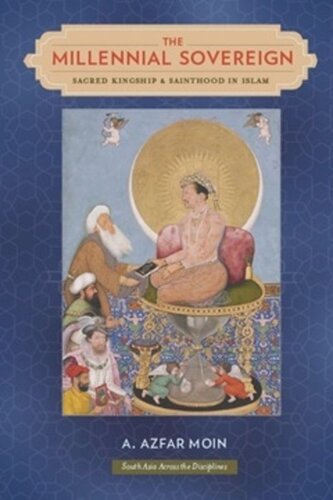

Most ebook files are in PDF format, so you can easily read them using various software such as Foxit Reader or directly on the Google Chrome browser.
Some ebook files are released by publishers in other formats such as .awz, .mobi, .epub, .fb2, etc. You may need to install specific software to read these formats on mobile/PC, such as Calibre.
Please read the tutorial at this link: https://ebookbell.com/faq
We offer FREE conversion to the popular formats you request; however, this may take some time. Therefore, right after payment, please email us, and we will try to provide the service as quickly as possible.
For some exceptional file formats or broken links (if any), please refrain from opening any disputes. Instead, email us first, and we will try to assist within a maximum of 6 hours.
EbookBell Team

4.8
94 reviewsA work of history richly informed by the anthropology of religion and art, The Millennial Sovereign traces how royal dynastic cults and shrine-centered Sufism came together in the imperial cultures of Timurid Central Asia, Safavid Iran, and Mughal India. By juxtaposing imperial chronicles, paintings, and architecture with theories of sainthood, apocalyptic treatises, and manuals on astrology and magic, Moin uncovers a pattern of Islamic politics shaped by Sufi and millennial motifs from the end of the sixteenth century to the turn of the first Islamic millennium. He also shows how alchemical symbols and astrological rituals enveloped the body of the monarch, casting him as both spiritual guide and material lord. These findings offer a striking new perspective on the history of Islam and the religious and political developments linking South Asia and Iran in early-modern times.
At the end of the sixteenth century and the turn of the first Islamic millennium, the powerful Mughal emperor Akbar declared himself the most sacred being on earth. The holiest of all saints and above the distinctions of religion, he styled himself as the messiah reborn. Yet the Mughal emperor was not alone in doing so. In this field-changing study, A. Azfar Moin explores why Muslim sovereigns in this period began to imitate the exalted nature of Sufi saints. Uncovering a startling yet widespread phenomenon, he shows how the charismatic pull of sainthood (wilayat)—rather than the draw of religious law (sharia) or holy war (jihad)—inspired a new style of sovereignty in Islam.
A work of history richly informed by the anthropology of religion and art, The Millennial Sovereign traces how royal dynastic cults and shrine-centered Sufism came together in the imperial cultures of Timurid Central Asia, Safavid Iran, and Mughal India. By juxtaposing imperial chronicles, paintings, and architecture with theories of sainthood, apocalyptic treatises, and manuals on astrology and magic, Moin uncovers a pattern of Islamic politics shaped by Sufi and millennial motifs. He shows how alchemical symbols and astrological rituals enveloped the body of the monarch, casting him as both spiritual guide and material lord. Ultimately, Moin offers a striking new perspective on the history of Islam and the religious and political developments linking South Asia and Iran in early-modern times.